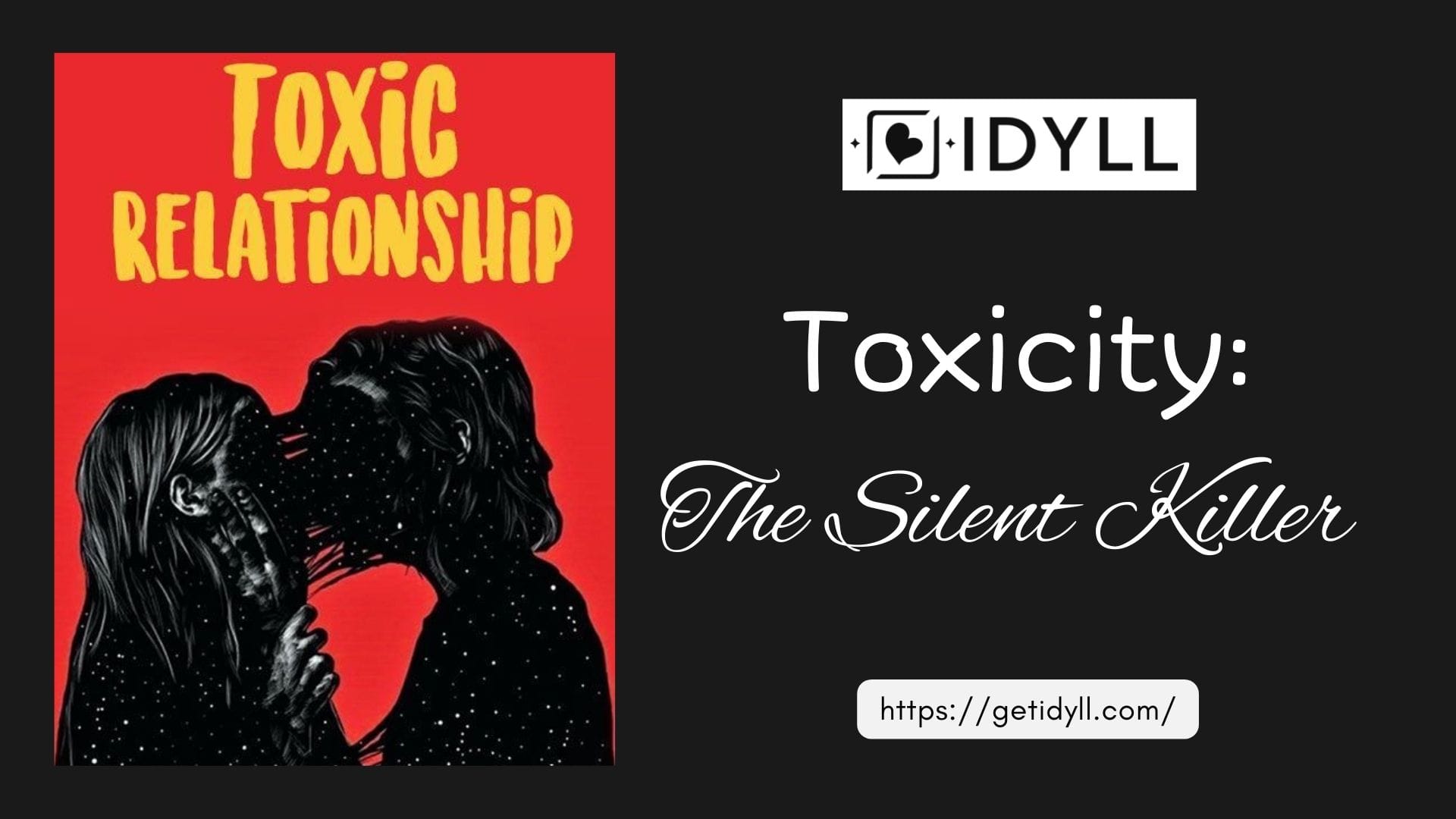Toxicity: The silent killer

Love—at its best, it's magic. You're caught up in the whirlwind of affection, passion, and those late-night conversations that make everything feel possible. But suddenly, that magic starts to fade, and the love that made you feel the butterflies suddenly makes everything feel drained, anxious and leaves you second guessing yourself.
Table of contents:
Here's the thing: Toxicity in love doesn't always show up with flashing red signs. It sneaks in, like a slow poison, turning affection into control, trust into suspicion, and happiness into emotional chaos. One moment you are smiling, thinking this person is your everything, and the next you are questioning if you're even good enough.
So, How do we know that the toxicity is creeping in? Here's exactly how:
Control and Manipulation
In a healthy relationship, love is all about equality—both partners have a say, both feel respected, and neither feels the need to dominate the other. But when the toxicity seeps in, control starts to rear its ugly head. And very honestly, one of the biggest signs of toxicity in love is control.
Control can look different depending on the relationship. It might start small and subtle, but gradually these subtle comments turn into demands, and suddenly you are hit with the realization that your partner is calling all the shots in the relationship.
Signs of control and manipulation
- Your partner makes decisions for you, even in small matters.
- They constantly "suggest" changes to your behavior, appearances, or habits.
- You feel guilty or anxious when you don't meet their expectations.
- They make you feel like you're overreacting when you bring up your concerns.
- You start cutting off people, hobbies, or activities that make them uncomfortable.

Toxicity disguises control as care, but don't be fooled. If you feel like you're losing yourself, it's time to take a step back and reevaluate.
Emotional Abuse
Not all toxic relationships involve physical violence, but emotional abuse can be just as harmful—if not more so. Toxicity in love often manifests as emotional manipulation, where your partner uses fear, guilt, and shame to control your emotions and actions.
This kind of abuse is often tricky because it's super subtle. It's not always about yelling insults (though they are part of it); it can just be as simple as withholding affection, giving silent treatment, or constantly criticizing you. They might gaslight you, making you question your own reality, and doubt your feelings.
Signs of emotional abuse
- Constant criticism or belittling, often disguised as "jokes."
- Your partner blames you for their mood or reactions
- They withhold punishment and give you silent treatment as punishment.
- You feel anxious, afraid, or unsure of yourself around them.
- They make you question your memory, feelings, or reality—this is gaslighting.



Emotional abuse
This is one of the most dangerous forms of toxicity in love since it's often not visible to outsiders. You might even not realize it yourself sometimes, but if you're living in constant fear or self doubt, it's time to ask whether this relationship is truly healthy.
Jealousy and possessiveness
Jealousy is normal in small doses—it's a human emotion, after all. But when toxicity ramps up jealous to a level where it controls your life, You've got a problem. Toxic partners don't just feel jealousy—they become possessive. They start demanding to know where you are, who you're with, and what you're doing at all times.
In healthy relationship, trust is foundation. But in one filled with toxicity, trust is replaced by suspicion, paranoia, and invasive behavior. They might accuse you of cheating or flirting with others, even when there's no basis for it.
Signs of toxic jealousy and possessiveness
- Constantly question your whereabouts, actions, or intentions.
- Wanting to know who you’re with at all times and getting upset if you’re not with them.
- Accusing you of being unfaithful, even when there’s no reason to suspect it.
- Demanding access to your phone, social media, or private messages.
- Trying to isolate you from friends and family.
Toxicity thrives on jealousy because it destroys trust, which is the foundation of any healthy relationship.
Lack of respect
Respect is essential in any relationship. Without it, love quickly turns toxic. When your partner doesn’t respect your feelings, boundaries, or opinions, you’re no longer in a healthy relationship—you’re in the midst of a toxic love story.
The key sign of toxicity here is that your partner sees you not as an equal, but as someone they can control, criticize, or walk all over. In toxic relationships, boundaries are seen as obstacles to be crossed rather than limits to be respected. This disrespect can be verbal, emotional, or even physical.
Signs of Lack of respect
- Your boundaries are constantly ignored or dismissed.
- They criticize your opinions, dreams, or feelings.
- You feel like your partner talks down to you or belittles you.
- Your privacy is violated (e.g., reading your messages without permission).
- They minimize your concerns or emotions, making you feel like you’re overreacting.

Respect is the cornerstone of love, and when toxicity takes over, it erodes any sense of equality or mutual care. Without respect, love can’t survive—and neither should your relationship.
Emotional exhaustion
Love is supposed to uplift, support, and energize you. Sure, every relationship has its ups and downs, but if you find yourself constantly drained, anxious, or walking on eggshells, that’s not love—that’s toxicity wearing you down.
Toxic relationships are emotionally taxing because they demand so much while giving so little in return. You’re always the one compromising, always the one apologizing, always the one trying to fix things. And yet, no matter how much you give, it’s never enough. This emotional exhaustion can take a serious toll on your mental health.
Signs of emotional exhaustion
- You feel drained after spending time with your partner, rather than uplifted.
- The relationship feels like a constant emotional rollercoaster, with more lows than highs.
- You’re always walking on eggshells, afraid to upset your partner.
- You feel like you’re constantly giving but receiving little emotional support in return.
- You start to feel anxious, depressed, or emotionally numb when thinking about the relationship

Toxicity manifests as this constant emotional drain, leaving you feeling like you’re carrying the weight of the relationship all by yourself. A healthy partnership should fill your cup, not leave you gasping for emotional air.
Conclusion
At the end of the day, love isn't supposed to make you feel small, afraid, or broken. Real love should lift you up, not tear you down. But when toxicity takes over, it distorts everything good about relationships and turns it into a source of pain.
Recognizing toxicity is the first step towards reclaiming your power. Don't let someone else's behavior diminish your worth or make you question your value. If you're seeing these signs in your relationship, it's time to take a step back and ask yourself: Is this the kind of love you deserve?
Remember: No relationship is worth losing yourself over.
If you're looking for a genuine dating app to find a perfect connection,
Download Idyll- The Perfect College Dating App!

